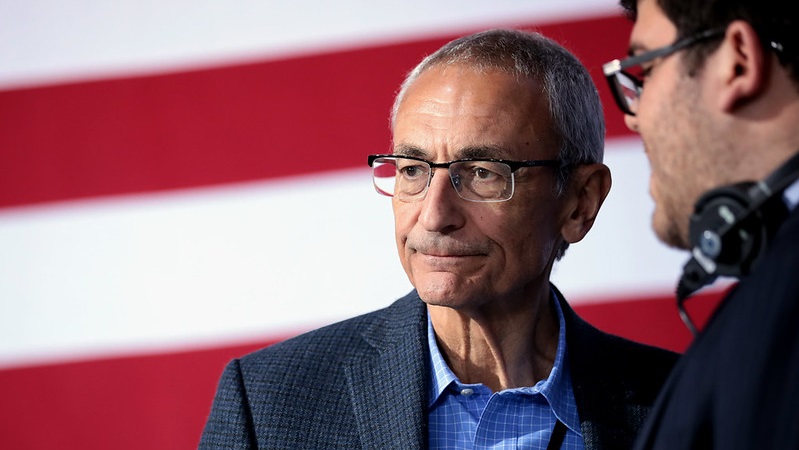US President Joe Biden has picked veteran Democratic official John Podesta as the US’s new top climate ambassador.
He replaces John Kerry who stepped down last month to campaign for Biden’s presidential bid.
The appointment received a mostly positive reaction from climate diplomats and campaigners, with praise for Podesta’s experience, contacts and knowledge. But some concerns were raised about him combining this new role with his domestically-focussed climate job.
Whereas Kerry was a climate envoy, Podesta will only be an adviser to the President. Unlike envoys, advisers do not have to be approved by the US Senate.
Podesta will oversee the US’s diplomacy up to and at Cop29 in Azerbaijan, which will start six days after the US election. His key task will be to negotiate a new long-term climate finance goal with developing countries.
Old hand
Seventy-five-year-old Podesta has been a high-profile figure in Washington DC for decades. He was president Bill Clinton’s chief of staff from 1998 to 2001 and acted as Barack Obama’s climate advisor in 2014-15, while the Paris Agreement was being negotiated.
In 2016, Podesta led Hillary Clinton’s unsuccessful presidential bid against Donald Trump. During the campaign, thousands of personal emails allegedly from Podesta were posted online after his account had been hacked.
In September 2022, Biden appointed him to oversee the rollout of the $369 billion green spending bill – the Inflation Reduction Act (IRA).
Podesta has been a strong defender of the IRA as it faced accusations of protectionism from Europe, the Far East and across the developing world. He told the Financial Times last year that the US makes “no apologies” for prioritising American jobs in its push for clean energy.
Steady pair of hands
Most big US green campaign groups like the National Resources Defence Council and Center for Climate and Energy Solutions welcomed his appointment.
E3G analyst Alden Meyer told Climate Home Podesta was “the ideal pick for this job” as “he has the experience, relationships and deep understanding of climate policy and politics needed to do an outstanding job”. “Most importantly”, he added, “he has the full confidence of president Biden”.
Abroad, Podesta’s announcement was broadly welcomed too although campaigners criticised the US’s climate record.
As Brazil’s then environment minister, Izabella Teixeira worked with Podesta on the Paris Agreement. She told Climate Home he was a “good choice” and “a man that understands very well the power of the dialogue” and “a good player of the multilateral system”.
Peruvian diplomat Manuel Pulgar-Vidal worked with Podesta as president of Cop20 in Lima. Now with WWF, he told Climate Home he “warmly welcome[d]” the appointment”.
“His role in securing the Paris Agreement, and recently in implementing the IRA, is testament to his skill and dedication,” Pulgar-Vidal said.
Li Shuo, from the Asia Society, described him as a “steady pair of hands” who “has extensive experience working with China during the Obama years and knows his Chinese counterparts well”.
“I hope his appointment will ensure consistency as the US and China follow the engagement path outlined by the Sunnylands agreement reached last year”, Li added.
Skepticism
But Harjeet Singh, from the Fossil Fuel Non-Proliferation Treaty Initiative, said the appointment “casts a shadow of doubt over the US’s commitment to global climate leadership”.
He said that Podesta was likely to focus on domestic action and “tread even more cautiously on the international stage than Kerry did”, suggesting that “international negotiations will become a secondary priority”.
“It reflects a continuous disregard for the US’s historical duty to provide developing nations with financial and technological support,” he said, adding “the international community grows increasingly skeptical of the US’s readiness to fulfill its global responsibilities.”
For Cop29 to succeed, rich nations must get their parliaments to agree more finance now
Mohammed Adow, director of Power Shift Africa, told Climate Home he hoped Podesta could bring the “urgency and purpose” of the IRA to his international climate diplomacy.
But, he added, the US “remains the world’s ultimate petro-state” as it is the biggest producer of oil and gas and has the largest historic emissions.
“Pairing this with the US offering a paltry amount in climate finance at the recent Cop28 talks and it’s clear that Podesta has a big job on his hands to get the US to be part of the solution to the climate crisis, rather than being part of the problem”, he said.
